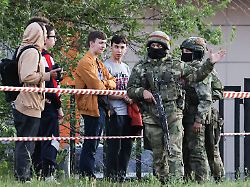Deal a “humiliation” for Putin
ISW: Wagner ridiculed the Russian army
06/25/2023, 09:51 am
According to the US think tank ISW, the Russian Wagner boss Prigozhin miscalculated his uprising. But the consequences are also devastating for the Kremlin, as the experts write. Russia’s President Putin was disgraced and paraded.
According to the US think tank Institute for the Study of War (ISW), the rebellion by Wagner boss Yevgeny Prigozhin revealed massive weaknesses in the Russian power apparatus. The uprising showed “that Putin is unable to deploy his troops in time to ward off an internal threat and that his monopoly on the use of force is being further undermined,” the analysts write. The rapid advance of the Wagner mercenaries towards Moscow made a large part of the regular Russian armed forces look ridiculous.
The uprising was probably triggered by the plan to subordinate the Wagner Group to the Russian Ministry of Defense by July 1. According to the ISW, Prigozhin saw this as a threat to his political and possibly also personal survival. “He therefore likely chose to take the risk of using his troops to change the leadership of the Department of Defense rather than lose the Wagner group altogether,” the analysis reads. He was probably hoping to win over defectors from the Defense Ministry, “which he didn’t succeed in doing.”
According to the ISW, the fact that the Belarusian ruler Alexander Lukashenko played a direct role in putting down the uprising is a “humiliation for Putin”. The Russian President probably approached Lukashenko. This indicates “that Lukashenko has an unspecified influence on Prigozhin”.
According to the think tank, the agreement brokered by Lukashenko will see the Wagner Group disappear as an independent actor. It is quite possible that some of the mercenaries will be assigned to the Russian Defense Ministry, as Defense Minister Sergei Shoigu originally planned. However, this could create tensions within the army.
For Russia, the agreement is “a short-term solution, not a long-term one.” The ISW does not expect the Russian government to collapse any time soon, but the balance in the Kremlin is “deeply unstable”. The experts assume that the uprising will “probably cause considerable damage” to Putin’s government and also to the Russian war of aggression against Ukraine.
